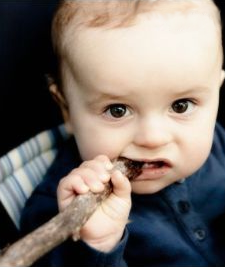Mother's milk and mud for immune kick-start
 A round-up of studies shows that a baby’s immune system is tuned by early exposure to germs and bugs.
A round-up of studies shows that a baby’s immune system is tuned by early exposure to germs and bugs.
Breastfeeding is the latest factor shown to influence a baby's immune system development and susceptibility to allergies and asthma.
Researchers have gone back over a range of studies to further advance the so-called ‘hygiene hypothesis’ theory, which says that early childhood exposure to microorganisms affects the immune system's development and onset of allergies.
“For years now, we've always thought that a sterile environment was not good for babies. Our research shows why. Exposure to these microorganisms, or bacteria, in the first few months after birth actually help stimulate the immune system,” says Dr Christine Johnson, chair of the Henry Ford Hospital's Department of Public Health Sciences in the US.
“The immune system is designed to be exposed to bacteria on a grand scale. If you minimise those exposures, the immune system won't develop optimally.”
Most of the benefits come by way of the gut microbiome – a collection of microorganisms in the gastrointestional tract, often referred to as a ‘bacterial ecosystem’.
The gut microbiome plays an important role in immune system development, and is thought to contribute to a host of diseases like obesity, autoimmune diseases, circulating disorders, pediatric allergies and infection.
In six separate studies, researchers sought to evaluate whether breastfeeding and maternal and birth factors had any effect on a baby’s gut microbiome and allergic and asthma outcomes.
They analysed stool samples from infants taken at one month and six months after birth, while also looking at whether the gut microbiome impacted the development of regulatory T-cells, which are known to regulate the immune system.
Some of the key findings were:
- Breastfed babies at one month and six months had distinct microbiome compositions compared to non-breastfed babies. These distinct compositions may influence immune system development.
- Breastfed babies at one month were at decreased risk of developing allergies to pets.
- Asthmatic children who had night-time coughing or flare-ups had a distinct microbiome composition during the first year of life.
- For the first time, gut microbiome composition was shown to be associated with increasing regulatory T-cells.
Researchers found that a baby's gut microbiome patterns vary by:
- A mother's race/ethnicity.
- A baby's gestational age at birth.
- Prenatal and postnatal exposure to tobacco smoke.
- Caesarean section versus vaginal delivery.
- Presence of pets in the home.
“The research is telling us that exposure to a higher and more diverse burden of environmental bacteria and specific patterns of gut bacteria appear to boost the immune system's protection against allergies and asthma,” Dr Johnson says.







 Print
Print